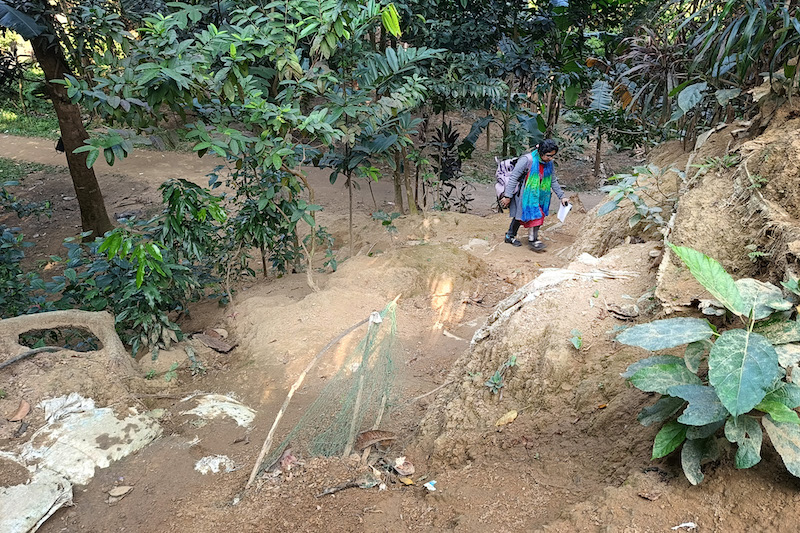


Human geography in Bangladesh
Photos courtesy of Naznin Nahar Sultana September 16, 2025
UD doctoral candidate amplifies the voice of a vulnerable community in Chittagong City
Growing up in Bangladesh, Naznin Nahar Sultana enjoyed looking out over the lush green hills east of Chittagong, the nation’s second-largest city on the Bay of Bengal. But as she got older, the hills were vanishing due to development and landslides that claimed hundreds of lives and destroyed thousands of homes.
Why? And why do people continue to live in such a dangerous landscape?
Those are the questions that now drive Sultana, a doctoral candidate in geography and spatial sciences at the University of Delaware. Funded as a Graduate Community Engagement Summer Scholar, Sultana spent the summer in Bangladesh doing field research, speaking to government officials, activists, NGOs and the community in the hills.
“Community engagement runs the full gamut from local to global,” said Michael Vaughan, the University’s chief community engagement officer and faculty director of the University’s Community Engagement Initiative (CEI). “In our backyard or thousands of miles away, we can partner and collaborate with communities to address complex problems at an individual and/or societal scale.”
Graduate Community Engagement Summer Scholars is a long-standing summer program offered by CEI to provide highly motivated graduate students the opportunity to immerse themselves in community-based projects.
Bangladesh is one of the world’s most climate-vulnerable countries. Cyclones, floods, riverbank erosion and salinity intrusion have forced those who rely on agriculture for their livelihood to find new places to live.

Driven from their homes, many move to Chittagong, a port city with a thriving garment industry. But rents in the city are out of reach for people who, Sultana said, are now “homeless, landless and resourceless.” In the hills of Chittagong City, they can raise livestock and garden in a green space where “they have some flavor of their villages and have additional earning sources.”
This influx of internally displaced people, a surge in development, a loss of traditional knowledge of the hills and a more intense rainy season have combined to increase the frequency of landslides in the region.
Government efforts to evacuate the informal settlements in the hills during the rainy season and to establish an early-warning system for landslides have been met with mixed success.
“There are political issues, institutional incapacities and exclusion of marginalized voices in the decision-making processes,” Sultana said. “But I want to focus on the conversation about the people who are really vulnerable in these processes and engage their voices in landslide management.”
Sultana went to the community to learn more about what keeps them in place.
“Fear of losing their land overshadows the fear of death,” she said. “Shelter and livelihood are an everyday struggle, but the rainy season only comes once a year.”
Sultana will propose a community-based land management program and community inclusion in decision-making about emergency shelters, solutions that recognize the experiences of the displaced and dispossessed.
“It is not possible to monitor the hills only by legal authorities,” she said, “unless the local community feels ‘this is my place, this is my land, and I need to protect it for my own interest.’ That’s why it is crucial to engage the community in the decision-making, implementation, and management processes.”
Sultana is one of a handful of students who are working in Bangladesh and being advised by Lindsay Naylor, associate professor of geography.
“The most important work that Naznin is doing is drawing attention to internally displaced people,” said Naylor. “These folks get left out of the planning process. By becoming internally displaced, they are almost being made invisible.”
An engaged university
The University of Delaware has a long tradition of applying knowledge, creativity and civic commitment to the critical challenges facing communities in Delaware, across the nation and around the world. Community-based projects and activities strengthen UD’s identity as an engaged research university.
UD earned the Community Engagement Classification in 2015 from the Carnegie Foundation for the Advancement of Teaching, which recognizes institutions of higher education for reciprocal collaboration with their larger communities.
Contact Us
Have a UDaily story idea?
Contact us at ocm@udel.edu
Members of the press
Contact us at mediarelations@udel.edu or visit the Media Relations website

